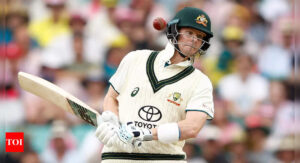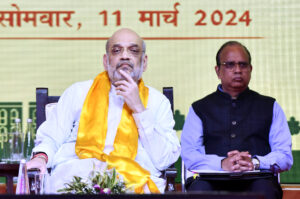Magician of strings, Shiv Kumar breathed soul into the santoor | India News – Times of India

[ad_1]
Shiv Kumar Sharma, who reshaped the personality and identity of santoor elevating the instrument’s profile and stature across the globe, and who composed a bunch of dulcet melodies in tandem with renowned flautist Hariprasad Chaurasia in Yash Chopra romances and thrillers, passed away following a heart attack in Mumbai on Tuesday morning. He was 84.
“He was on regular dialysis but was still active. He was to perform in Bhopal next week,” a family source told PTI. With his arresting features — the shock of hair being his signature — the santoor maestro regaled music lovers in thousands of concerts over decades; his jugalbandis with Chaurasia and tabla virtuoso Zakir Hussain a treat to the ear and the soul. But the accolade and the glory came after a long struggle to gain respect for the instrument he played.
“My story is different from other classical musicians. While they had to prove their mettle, their talent, their calibre, I had to prove the worth of my instrument. I had to fight for it,” Sharma told The Times of India in 2002. cynicism, he made an obscure staccato instrument capable of a convincing presence in classical music. His ascension to the Hindustani Music Hall of Fame is even more significant because it coincided with the era ruled by forVilayat Khan, Pt Ravi Shankar, and Ustad Ali Akbar Khan,” musicologist Deepak Raja said.
Jammu-born Sharma was ushered into music when just five by his vocalist father Uma Dutt Sharma of Benaras gharana and showed promise in both vocals and tabla. But the notes changed when he was 13 after his father brought a gift from Srinagar. “I tore at the wrapping paper eagerly, expecting a game or something else as exciting. But the box held a strange-looking musical instrument which I hadn’t seen before! And that’s how I was introduced to the santoor,” he told TOI in 2001. The Dogri musician’s father-guru wanted him to play this instrument. “At that time, the santoor was used only in Sufiana music in a small pocket in Kashmir. No other part of India had ever seen it. But dad wanted it to be developed for national use in Indian classical music — and he entrusted the job to me,” he said.
In 1955, Sharma came to Bombay for a concert packed with the galacticos of Indian classical music: Bade Ghulam Ali Khan, Ali Akbar Khan, Ravi Shankar, among others. He was just 17. But he made an impact. The same year Sharma also composed a background piece in V Shantaram’s film, ‘Jhanak Jhanak Payal Baaje’ (1955) for music director Vasant Desai.
But many critics were far from convinced about santoor’s range. “… connoisseurs rejected it as a complete instrument since I couldn’t play alaap. Santoor is essentially a percussion instrument played by strikers. It can’t sustain the vibrations and so, there was no scope for meend (glide from one note to another)…I modified the instrument and created a distinct character,” he once told TOI. Much against his father’s wishes, Sharma came to Bombay in 1960, hoping to build a career as a freelance musician. Over the years, his services were utilised by top Hindi film composers, including Hemant Kumar (‘Bees Saal Baad’), Jaidev (‘Hum Dono’), SD Burman (‘Guide’) and RD Burman.
‘Call of the Valley’ was released in 1967. The long-playing record, put together by the trio of Sharma, flautist Hariprasad Chaurasia and guitarist Brij Bhushan Kabra, musically expanded on a day in the life of a shepherd through a bouquet of ragas. The album steadily entered the music shelves of the culturally-inclined and became a milestone in their careers.
When director Yash Chopra introduced Sharma and Chaurasia as a composer duo in ‘Silsila’ (1981), the film industry was surprised. Silsila was a multi-starrer and roping in two classical musicians, Shiv-Hari as they were christened, was deemed a commercial risk. In the end, the music turned out to be one of Silisila’s few highlights. Shiv-Hari became regulars for Chopra (‘Faasle’, ‘Vijay’). In the Eighties, when melody had largely taken a backseat in mainstream commercial ventures, they provided ear-pleasing yet chartbusting scores, most notably in ‘Chandni’ (1989). That the two had internalised the idiom of Hindi film music was most evident in ‘Darr’ (1993), where they delivered a score that fused seamlessly with the demands of a thriller.
“He was on regular dialysis but was still active. He was to perform in Bhopal next week,” a family source told PTI. With his arresting features — the shock of hair being his signature — the santoor maestro regaled music lovers in thousands of concerts over decades; his jugalbandis with Chaurasia and tabla virtuoso Zakir Hussain a treat to the ear and the soul. But the accolade and the glory came after a long struggle to gain respect for the instrument he played.
“My story is different from other classical musicians. While they had to prove their mettle, their talent, their calibre, I had to prove the worth of my instrument. I had to fight for it,” Sharma told The Times of India in 2002. cynicism, he made an obscure staccato instrument capable of a convincing presence in classical music. His ascension to the Hindustani Music Hall of Fame is even more significant because it coincided with the era ruled by forVilayat Khan, Pt Ravi Shankar, and Ustad Ali Akbar Khan,” musicologist Deepak Raja said.
Jammu-born Sharma was ushered into music when just five by his vocalist father Uma Dutt Sharma of Benaras gharana and showed promise in both vocals and tabla. But the notes changed when he was 13 after his father brought a gift from Srinagar. “I tore at the wrapping paper eagerly, expecting a game or something else as exciting. But the box held a strange-looking musical instrument which I hadn’t seen before! And that’s how I was introduced to the santoor,” he told TOI in 2001. The Dogri musician’s father-guru wanted him to play this instrument. “At that time, the santoor was used only in Sufiana music in a small pocket in Kashmir. No other part of India had ever seen it. But dad wanted it to be developed for national use in Indian classical music — and he entrusted the job to me,” he said.
In 1955, Sharma came to Bombay for a concert packed with the galacticos of Indian classical music: Bade Ghulam Ali Khan, Ali Akbar Khan, Ravi Shankar, among others. He was just 17. But he made an impact. The same year Sharma also composed a background piece in V Shantaram’s film, ‘Jhanak Jhanak Payal Baaje’ (1955) for music director Vasant Desai.
But many critics were far from convinced about santoor’s range. “… connoisseurs rejected it as a complete instrument since I couldn’t play alaap. Santoor is essentially a percussion instrument played by strikers. It can’t sustain the vibrations and so, there was no scope for meend (glide from one note to another)…I modified the instrument and created a distinct character,” he once told TOI. Much against his father’s wishes, Sharma came to Bombay in 1960, hoping to build a career as a freelance musician. Over the years, his services were utilised by top Hindi film composers, including Hemant Kumar (‘Bees Saal Baad’), Jaidev (‘Hum Dono’), SD Burman (‘Guide’) and RD Burman.
‘Call of the Valley’ was released in 1967. The long-playing record, put together by the trio of Sharma, flautist Hariprasad Chaurasia and guitarist Brij Bhushan Kabra, musically expanded on a day in the life of a shepherd through a bouquet of ragas. The album steadily entered the music shelves of the culturally-inclined and became a milestone in their careers.
When director Yash Chopra introduced Sharma and Chaurasia as a composer duo in ‘Silsila’ (1981), the film industry was surprised. Silsila was a multi-starrer and roping in two classical musicians, Shiv-Hari as they were christened, was deemed a commercial risk. In the end, the music turned out to be one of Silisila’s few highlights. Shiv-Hari became regulars for Chopra (‘Faasle’, ‘Vijay’). In the Eighties, when melody had largely taken a backseat in mainstream commercial ventures, they provided ear-pleasing yet chartbusting scores, most notably in ‘Chandni’ (1989). That the two had internalised the idiom of Hindi film music was most evident in ‘Darr’ (1993), where they delivered a score that fused seamlessly with the demands of a thriller.
[ad_2]
Source link






